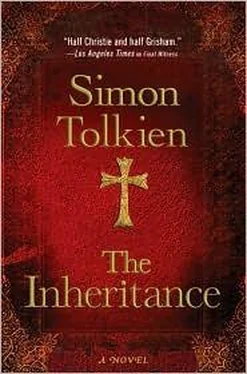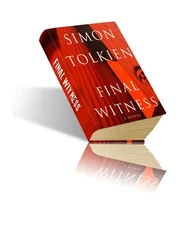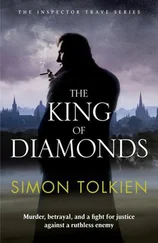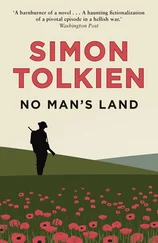Simon Tolkien - The Inheritance
Здесь есть возможность читать онлайн «Simon Tolkien - The Inheritance» — ознакомительный отрывок электронной книги совершенно бесплатно, а после прочтения отрывка купить полную версию. В некоторых случаях можно слушать аудио, скачать через торрент в формате fb2 и присутствует краткое содержание. Жанр: Полицейский детектив, на английском языке. Описание произведения, (предисловие) а так же отзывы посетителей доступны на портале библиотеки ЛибКат.
- Название:The Inheritance
- Автор:
- Жанр:
- Год:неизвестен
- ISBN:нет данных
- Рейтинг книги:4 / 5. Голосов: 1
-
Избранное:Добавить в избранное
- Отзывы:
-
Ваша оценка:
- 80
- 1
- 2
- 3
- 4
- 5
The Inheritance: краткое содержание, описание и аннотация
Предлагаем к чтению аннотацию, описание, краткое содержание или предисловие (зависит от того, что написал сам автор книги «The Inheritance»). Если вы не нашли необходимую информацию о книге — напишите в комментариях, мы постараемся отыскать её.
The Inheritance — читать онлайн ознакомительный отрывок
Ниже представлен текст книги, разбитый по страницам. Система сохранения места последней прочитанной страницы, позволяет с удобством читать онлайн бесплатно книгу «The Inheritance», без необходимости каждый раз заново искать на чём Вы остановились. Поставьте закладку, и сможете в любой момент перейти на страницу, на которой закончили чтение.
Интервал:
Закладка:
Simon Tolkien
The Inheritance
INTRODUCTORY NOTE
The controversial executions of Derek Bentley and Ruth Ellis in the 1950s increased public pressure in the United Kingdom for the abolition of hanging, and this was answered in part by the passing of the Homicide Act in 1957, which limited the imposition of the death penalty to five specific categories of murder. Henceforward only those convicted of killing police officers or prison guards and those who had committed a murder by shooting or in the furtherance of theft or when resisting arrest could suffer the ultimate punishment. The effect of this unsatisfactory legislation was that a poisoner or strangler acting with premeditation would escape the rope, whereas a man who shot another in a fit of rage might not. This anomaly no doubt helped the campaign for outright
abolition, which finally reached fruition with the passage of the Murder (Abolition of Death Penalty) Act in 1965.
Death sentences were carried out far more quickly in England in the 1950s than they are in the United States today. A single appeal against the conviction but not the sentence was allowed, and, if it failed, the home secretary made a final decision on whether to exercise the royal prerogative of mercy on behalf of the Queen, marking the file “the law must take its course” if there were to be no reprieve. There was often no more than a month’s interval between conviction and execution. Ruth Ellis, for example, spent just three weeks and three days in the condemned cell at Holloway Prison in 1955 before she was hung by Albert Pierrepoint for the crime of shooting her boyfriend.
There was thus very little time available for lawyers or other interested parties trying desperately to uncover new evidence that might exonerate a client sentenced to die. They were quite literally working against the clock.
PROLOGUE
They were safe in the trees, waiting for the Germans to come. Carson had driven the Jeep off the drive, and the silver-grey branches had crackled and broke as he’d wedged it into its hiding place. And now they waited on either side of the road with their fingers on the triggers of their American-made machine guns. Nothing. No wind in the trees, no movement in the air, until just after eight o’clock, when the dust came up in a yellow cloud and the two trucks came round the corner.
And then Ritter felt the bullets feeding through the magazine, the quick vibrations in his arms from the gun, and saw the men in the trucks jumping up and down like puppets. There was one young soldier at the end who ran away down the road, but Colonel Cade walked out of the trees with his rifle and shot him in the back of the head just before he reached the corner. It was a good ambush.
Afterward, Carson and Ritter pushed the trucks into the woods, while the colonel selected rifles and pistols from the bodies of their dead owners. Three of each. He made them leave their own guns behind.
And so they walked on up to the house with the dead soldiers’ rifles slung over their shoulders and the snub-nosed German Mauser pistols in their pockets. They were a strange, ill-assorted group. Walking in the middle, the tall, thin colonel towered over his two companions. His pale blue eyes were almost opaque, revealing nothing of the man inside, and his long aquiline nose gave him an ascetic look that seemed oddly at variance with his uniform. And yet he carried himself with an air of natural authority that made it obvious that he was the man in charge.
On the colonel’s right, Sergeant Ritter was far more clearly a military man with his clipped black moustache and polished shoes and buttons. He was a big man and he had begun to sweat in the evening heat. But he didn’t complain. He knew that they had work to do. Looking past the colonel, Ritter glared over at Corporal Carson, who was walking with a deliberate swagger, swaying his narrow hips and shoulders as he expertly flicked a piece of chewing gum from one side of his mouth to the other in time with each step he took. The young man’s disrespect disgusted Ritter. But he kept his peace. Carson had been the only soldier he could find to do the job. He’d have to do.
They walked past green stony fields and rows of overgrown vines until they came to a fork in the drive and passed an old sign on which someone had once upon a time painted the words “Propriete Privee.” It was nailed to the trunk of a plane tree, and Carson read it out loud in his cockney accent and laughed like it was some kind of joke. But the colonel ignored him. He had other things on his mind.
One more turning and the trees stopped suddenly on both sides, and there was the house. It was much smaller than Ritter had expected-not his idea of a chateau at all. The glass was broken in several of the small windows that appeared at regular intervals in the stone facade, and the guttering was hanging loose from one corner of the roof. Over to the left, a solitary black-and-white cow stood in the shade of a primitive lean-to. Her great red tongue was lolling out of her mouth, and she had clearly been suffering in the afternoon heat. It was unusual for the time of year, and Ritter wondered inconsequentially whether she was aware of the lake that stretched out like a sheet of black glass several hundred yards beyond the house. On the far shore, the town of Marjean shimmered in the distance.
The church stood on a ridge above the chateau, and it was clearly the more impressive of the two buildings. Even Ritter could sense its antiquity. The bell tower glowed silver in the translucent evening light, and the gargoyles-devils and apes with deformed backs and monstrous faces-gaped down at the world below.
There had been devils here already-German devils-but they seemed to have left the church well alone. A swastika flag hung limply from a pole standing near the corner of the house, and a litter of papers on the dried-up lawn bore witness to the suddenness of the Germans’ departure. But their hosts had remained behind, and Henri Rocard and his wife were already standing in the doorway of their house when the three British soldiers came out of the trees and walked across the grass toward them.
It was the colonel who did the talking, and Ritter understood almost none of it, but then again he didn’t need to. He knew already that the colonel wanted something from these people, and he was here to help the colonel get it, if the colonel needed help. Back at the camp outside Moirtier, Cade had already explained that he was prepared to pay good money for what he wanted. More than the thing was worth. It was Rocard who was being unreasonable.
Ritter didn’t like the look of the Frenchman. He was thick and short, built like one of those middleweights that Ritter had gone to watch in Nottingham when he was a boy. And his dark eyes were small, staring out suspiciously from his wrinkled face. He had probably not yet turned fifty, but the sun had burnt his skin to a pale leather, aging him beyond his years.
Madame Rocard seemed to be a little older than her husband, but she remained an attractive woman. She stood up straight, and her black hair was pulled back severely from her well-shaped face. She was full-breasted and defiant, and Ritter would have liked to have pushed her back into the cool interior of her house, down onto the red flagstones in the hall, and fucked her until he’d had his fill. They were collaborators, and they deserved everything that was coming to them-unless they were reasonable. And the anger in the squat little Frenchman’s voice, his evident hostility toward the colonel, didn’t make a peaceful solution seem likely.
Suddenly the colonel went forward and took hold of the Frenchwoman’s arm, pulling her toward him. And in the same movement, he took the German pistol out of his pocket and pushed it hard against the side of her handsome head. But still Rocard refused to give way, even when Cade let go of the woman’s arm and used his free hand to pull back the hammer of the gun.
Читать дальшеИнтервал:
Закладка:
Похожие книги на «The Inheritance»
Представляем Вашему вниманию похожие книги на «The Inheritance» списком для выбора. Мы отобрали схожую по названию и смыслу литературу в надежде предоставить читателям больше вариантов отыскать новые, интересные, ещё непрочитанные произведения.
Обсуждение, отзывы о книге «The Inheritance» и просто собственные мнения читателей. Оставьте ваши комментарии, напишите, что Вы думаете о произведении, его смысле или главных героях. Укажите что конкретно понравилось, а что нет, и почему Вы так считаете.












